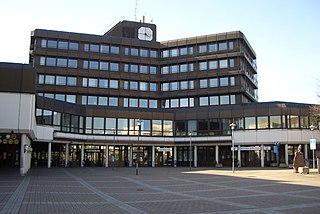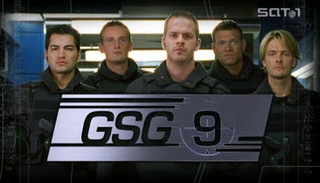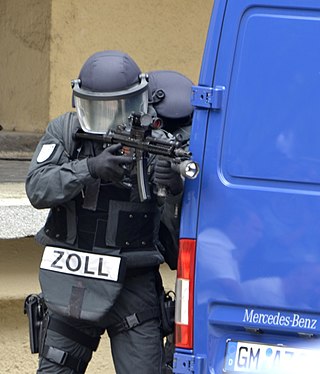Related Research Articles
GSG 9 der Bundespolizei, formerly Grenzschutzgruppe 9, is an elite special forces unit of the German Federal Police (Bundespolizei) to combat terrorism and violent crime, including organized crime. In addition to its headquarters location in Sankt Augustin-Hangelar near Bonn, it has a second location in Berlin. Since 1 August 2017, it has been subordinate to the Federal Police Directorate 11. The state police (Landespolizei) maintain their own regional tactical units known as the Spezialeinsatzkommando (SEK).
Ulrich Klaus "Ricky" Wegener was a German police officer of the Federal Border Guard and founding member of the counter-terrorist force GSG 9.

The Kommando Spezialkräfte (KSK) is the special forces military unit and a large brigade-level unit of the German Armed Forces (Bundeswehr) for special operations and commando warfare, reconnaissance, counterterrorism, combat search and rescue as well as military advisor. The KSK reports to the Rapid Forces Division (DSK) and is stationed in the Graf Zeppelin barracks in Calw, Baden-Württemberg.

The Deutsche Volkspolizei, commonly known as the Volkspolizei or VoPo, was the national uniformed police force of the German Democratic Republic from 1945 to 1990. The Volkspolizei was a highly-centralized agency responsible for most civilian law enforcement in East Germany, maintaining 257,500 personnel at its peak. It worked closely along with the Stasi to maintain public order and identify threats to the regime.

The National Security Guard (NSG), commonly known as Black Cats, is a counter-terrorism unit of India under the Ministry of Home Affairs. It was founded on 16 October 1984, following Operation Blue Star, to combat terrorist activities and protect states against internal disturbances. Formalised in the Parliament of India under the National Security Guard Act, 1986. It is one of the seven Central Armed Police Forces of India.

Bundesgrenzschutz is the former name of the German Bundespolizei. Established on 16 March 1951 as a subordinate agency of the Federal Ministry of the Interior, the BGS originally was primarily focused on protecting the West German borders. During their early days, BGS units had military structures, training and equipment. The law enforcement officers legally had military combatant status until 1994. A major part of the early BGS personnel joined the newly founded German Armed Forces (Bundeswehr) in 1956 and thus significantly contributed to West Germany's rearmament. The BGS was renamed to Bundespolizei on 1 July 2005. The change of name did not have any effect on the legal status or competencies of the agency, but rather reflects its transition to a multi-faceted police agency with control over border, railway and air security.

The Federal Police is the national and principal federal law enforcement agency of the German Federal Government, being subordinate to the Federal Ministry of the Interior, Building and Community. The Federal Police is primarily responsible for border protection and railroad and aviation/air security. In addition, the agency is responsible, among other tasks, for the protection of federal constitutional bodies. It provides the federal alert police and GSG 9 special police unit, which can also be used to support the federated states of Germany. Ordinary police forces, meanwhile, are under the administration of the individual German states (Bundesländer) and are known as the Landespolizei. In addition to the Federal Police, the Federal Criminal Police Office and the German Parliament Police exist as further police authorities at the federal level.

EKO Cobra is the police tactical unit of the Austrian Federal Ministry of the Interior. EKO Cobra is not part of the Austrian Federal Police, but instead is directly under the control of the Federal Ministry of the Interior.

Lufthansa Flight 181 was a Boeing 737-230C jetliner named Landshut that was hijacked on 13 October 1977 by four members of the Popular Front for the Liberation of Palestine, who called themselves Commando Martyr Halima. The objective of the hijacking was to secure the release of imprisoned Red Army Faction leaders in German prisons. In the early hours of 18 October, just after midnight, the West German counter-terrorism group GSG 9, backed by the Somali Armed Forces, stormed the aircraft in Mogadishu, Somalia, with 86 passengers and four of the total five crew rescued. The rescue operation was codenamed Feuerzauber. The hijacking is considered to be part of the German Autumn. 3 hijackers and the captain were killed.

Sankt Augustin is a town in the Rhein-Sieg district in North Rhine-Westphalia, Germany. It is named after the patron saint of the Divine Word Missionaries, Saint Augustine of Hippo (354-430). The Missionaries established a monastery near the current town centre in 1913. The municipality of Sankt Augustin was established in 1969, and on September 6, 1977 Sankt Augustin acquired town privileges. Sankt Augustin is situated about eight km northeast of Bonn and three km southwest of Siegburg.

Law enforcement in Germany is constitutionally vested solely with the states, which is one of the main features of the German political system.

GSG 9 is a German TV series about the special unit GSG 9 der Bundespolizei of the German Federal Police. It premiered in the spring of 2007.

The TM-170 is an armored personnel carrier was announced for the first time in 1978 and entered production in 1979. It was originally designed primarily for use as an APC or an internal security vehicle, but could be adapted for a wide range of other roles.
The German special forces include the Special Operations Command of the German Army and the Naval Special Forces Command of the German Navy. Both are regular units and fully integrated into the branches of the German Armed Forces. During operations, special forces personnel are under the command of the special operations division of the Armed Forces Operations Command in Potsdam, a branch of the Joint Support Service (Streitkräftebasis).

Evidence and arrest units are special units of the German state police forces Landespolizei and the German Federal Police.

The Zentrale Unterstützungsgruppe Zoll (ZUZ) is the police tactical unit of the German Customs Service (Bundeszollverwaltung) and subordinate to the German Customs Investigation Bureau.

Polizeiliche Schutzaufgaben Ausland der Bundespolizei is a specialized unit of the German Federal Police tasked with providing personal security for German diplomatic missions in conflict regions.

Berlin is a city-state and the capital of the Federal Republic of Germany.

Naval Special Forces Command, also called the Kampfschwimmer or Verwendungsgruppe 3402, are an elite special operations unit of the German Navy, specializing in commando and amphibious warfare operations. They are the only special-purpose force of the German Navy. The Kampfschwimmer were set up when West Germany joined NATO in 1955 making it the oldest German SOF.
References
- ↑ "Bundespolizei - GSG 9 der Bundespolizei - die "Olympiade der Spezialeinheiten" bei der GSG 9 der Bundespolizei". Archived from the original on 2014-08-26. Retrieved 2013-09-10.